 Group photo of Bidibidi artists celebrating their success
Group photo of Bidibidi artists celebrating their success
Planting Seeds of Love in South Sudan
in the words of Pam Donkin and Stephen Wandu Bimo
It all began in October 2018 with a post to the CMN online forum from new member Stephen Wandu Bimo:
Hi everyone!
I am the cofounder of an organisation called I CAN South Sudan, along with a lady called Angela Kyobutungi and a gentleman called Seme Ludanga. Seme and I are both refugees from South Sudan, while Kyobutungi is a Ugandan who has shown sympathy with refugees from South Sudan and has stood with us to help these children. We were inspired to set up I CAN South Sudan in 2017 when we became aware that many unaccompanied refugee children who had been orphaned or separated from their parents by the civil war that rages in my country were arriving at the Bidibidi refugee camp. Traumatised by conflict, flight, and the loss of family, and without a strong support network, we realised that these children needed our help and support. . . .
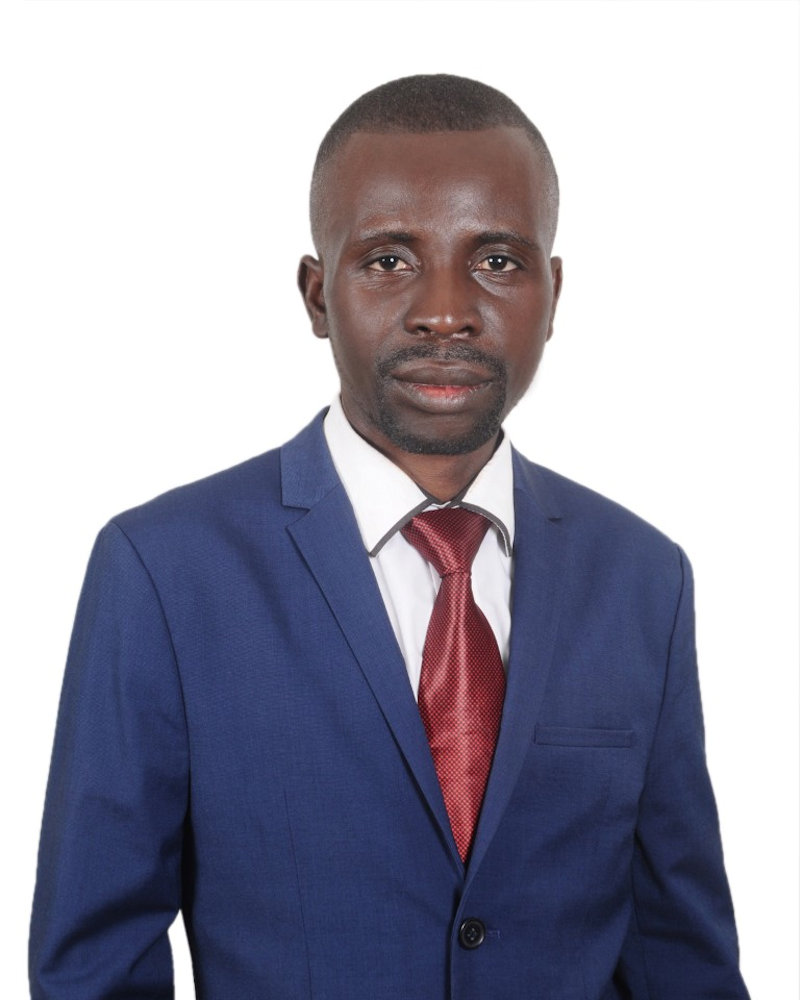 Stephen Wandu Bimo
Stephen Wandu Bimo
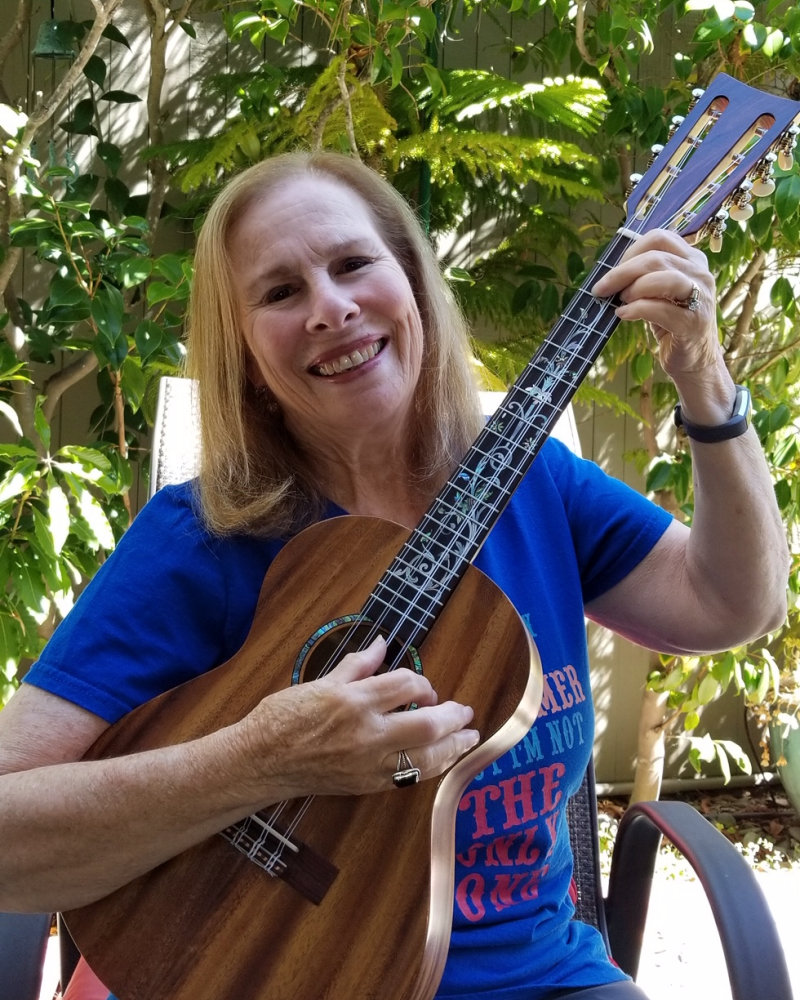 Pam Donkin
Pam Donkin
As you probably know, conflicts between tribes are a major problem in the war that has decimated South Sudan, and one of the aims of our project is to bring together children from all backgrounds and encourage them to work together. . . . We foster musical skills in children and teach children both new and traditional songs. We are careful to make sure that the traditional songs come from many different South Sudanese cultures, for two reasons: firstly, we believe that this can help to heal some of the bitter tribal divisions that have led to civil war. Secondly, we want to give the children a sense of continuity, home, and identity as they learn to survive in a new country.
We have now been running for 9 months, helping 20 children. We give them musical training but also help with additional basic needs (in short supply at the camp), school materials, and take them on recreational trips to help them heal.
We have already been able to record some songs with the children—you can hear these on our website: www.icansouthsudan.com/i-can-childrens-music.
However, we run on a shoestring budget: initial funding this year of just €5,000 helped us to start the project, but we are now in desperate need of further funds to continue the programme and ideally expand it to help more children.
We would like to request for your music to teach our children and possibly with your permission send it to South Sudan radio stations . . . that we partner with and that host children programs so that children from South Sudan can learn the songs to be used in schools. There is not much music in schools in South Sudan, only in few nursery schools who still use century-old songs. Your music can give them something new, and we will be ready to partner and create more children’s music clubs in schools in South Sudan if this signed peace holds.
Many CMN members rushed to send songs to Stephen, for which he was very grateful. But he got more than songs from Pam Donkin, whose Planting Seeds of Love project turned out to be a beautiful fit for a partnership with I CAN Sudan. Here is the story of that partnership, told in their (lightly edited) words, and in the voices and faces of the children of I CAN.
Pam’s video of her song, “Planting Seeds of Love”
Stephen: In October 2017, when we started this initiative of engaging unaccompanied refugee children in social and musical activities, we never had any link to any organization using music as a tool to engage children. Deep down, we knew there might be an organization or people out there who loved working with children the way we do. We knew we could not achieve all our missions and goals alone and hence we needed friends, organizations, and partners to help us grow. We Google searched the words “Children and music” to be able to find organizations and partners to work with, but most responses were either negative or there was no reply at all.
On September 19, 2018, I was searching again through our Twitter account and found out about the CMN conference. I got interested and immediately went on to read from the CMN website, and that is where I found the great work CMN is doing. I also read members’ comments about CMN—how it has helped them grow and achieve success with children.
I immediately wrote to Jane Arsham, telling her our interest in joining the network. Jane replied the same day and told us she had sent our message to the Board and they would like to offer us “online” membership at no charge to give us access to the song library and to Pass It On! We were happy for the quick and kind response. Jane also got us to the CMN forum. The financial support from members, the guidance on how to deal with children, the encouraging messages, the promotion of our music online, and the fundraising efforts by Valerie [Smalkin], all have made us to stronger.
Pam: Originally, Stephen found my song, “Planting Seeds of Love,” through CMN. I found out that he had had it played on the radio! Later, when he posted that he was looking for some activities he could do around music, I sent him an email directing him to plantingseedsoflove.com where he could find lesson plans to go along with the song he was already using. The lesson plans had been sent to me by members of CMN when I originally set up the website.
Stephen: I CAN South Sudan has a “Children Peace Building Initiative” project for 2019 from which we would like to build peace among the South Sudanese refugee communities in Bidibidi: for reconciliation, forgiveness, unity, and love among the warring refugee community as we pray and wait for the implementation of Peace Agreement signed in September 2018. So this Planting Seeds of Love program can be used by us to plant seeds of love in the heart of the refugees through drawings, drama, and music.
Pam: Steven contacted me via email saying he had gone to the website and downloaded all the lesson plans and activities and had some questions. As it turned out, some of the activities required more water than was available and electricity, which they also did not have. So little by little, over about a week, we discussed what was possible and made a list of what items would be needed.
The children would need colored pencils, pens, and paper (blank art books) for completing the pages that would say: I am planting seeds of love in my ____. Or I am planting seeds of _____in my heart and so on. They would also need seeds to plant so their seeds of love could grow and be given to others in peacebuilding. When I was told by Stephen that they did not have seeds or those art supplies, I was filled with the feeling that I wanted these children, such strong children, to be able to express themselves through drawing and writing.
I offered to fund the cost.
My dream was to send “Planting Seeds of Love” into the world as a mission for peace and love, and this idea of helping the South Sudanese refugee community build peace with these children, in a country across the world, was literally a dream come true!
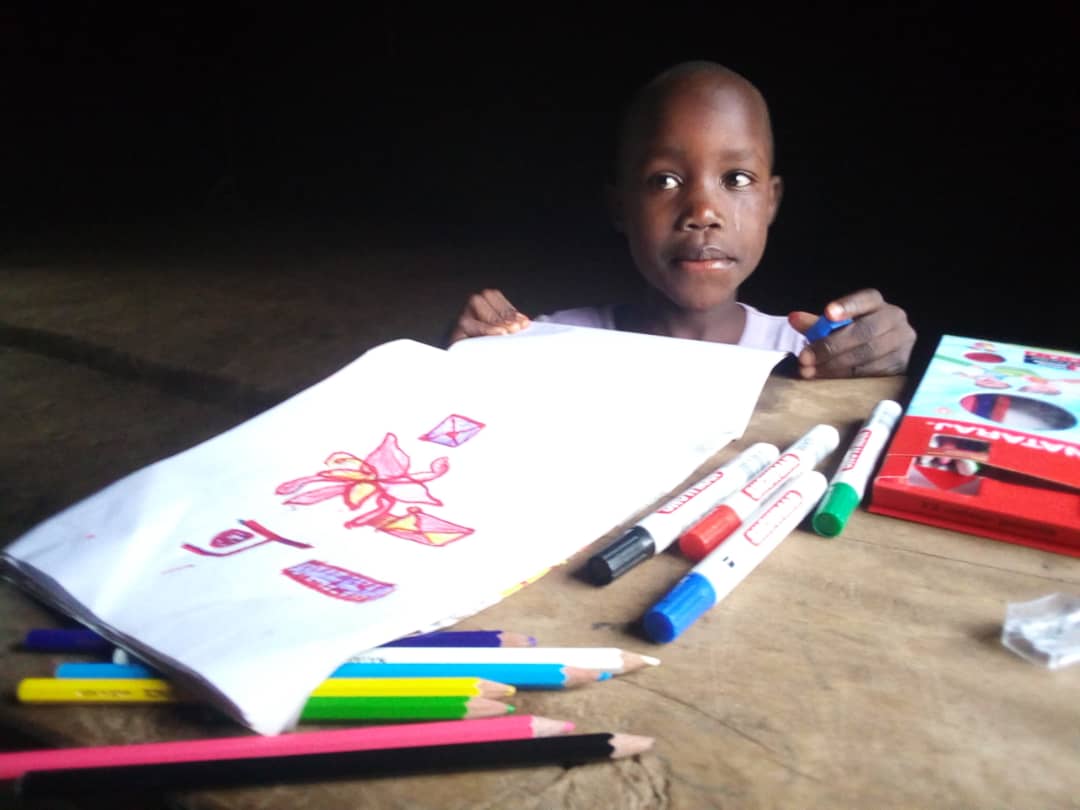 A child shows off artwork in progress.
A child shows off artwork in progress.
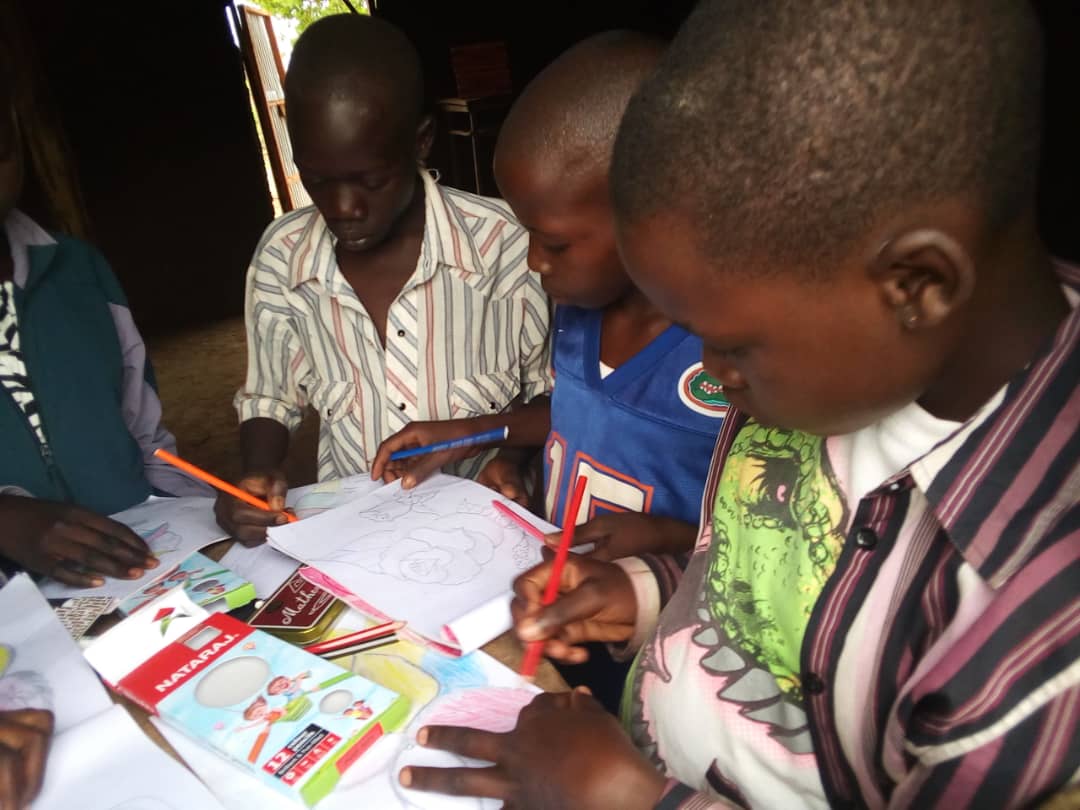 Young artists at work in Bidibidi
Young artists at work in Bidibidi
Stephen: We launched the project of Planting Seeds of Love in Bidibidi refugee settlement with thirty children. The children were taught the “Planting Seeds of Love” song, then shown on a laptop the video of the activities Pam had sent to us. We reminded them of the situation we as South Sudanese people have faced and how we can use this program to plant seeds of love among the refugee community in Bidibidi.
The children were given the freedom to draw, and the result of that was amazing. They drew houses, flowers, families, pumpkins, and more.
We asked the children what they would like to plant in their hearts, schools, communities, churches, country, etc. They came up with words like peace, love, unity, kindness, hope, joy, happiness, and wrote the words beside their drawings.
We asked the children to get containers to plant their seeds in and to draw a symbol of a heart and write the words “I am planting seeds of (love, peace, etc.) in my (heart, school, etc.).” to stick on their containers.
Pam: The Planting Seeds of Love book activity, in which children draw their pictures and complete the written pages, can usually be combined into a classroom book or a child’s personal book to take home. In their case, due to lack of supplies, the I CAN children’s pictures were instead photographed and put on video, which turned out to be a great way to adjust that activity for them.
Angelina Daniel, age thirteen, takes part in the Planting Seeds of Love program.
Also, in Bidibidi, there is not enough water or seeds to make the Planting Seeds of Love garden, so the children made individual seed planters and decorated them with their paper drawings. Instead of a garden, they are giving the plantings to others, to further their goal of reconciliation!
Stephen: Bidibidi is a rocky place with no immediate water source. Given this situation, it has been difficult to get water for irrigating the seeds planted by the children. It is also in total blackout with no source of power, only the use of a power generator. Challenges like these have only helped us to plan better and to see how best we can achieve the goal of the program, which is to build peace among the refugee communities.
Pam: In a way, I think the adjustments we made turned out better for this population. And the communication was easier than I could have imagined. Though we are on different time zones, using email and messenger we communicated very easily.
Stephen: Distance is not a barrier for a great idea to be implemented together. We have loved planning and discussing with Pam and getting her continuous guidance.
When we started Planting Seeds of Love, we concentrated mostly on music and didn’t think of drawing as a tool to heal the children of trauma. But this program has now brought to our attention the hidden talent of these children. Some of these children are very good at drawing and we need to nurture this talent. The children enjoyed drawing together and were so excited to show each other what they have drawn. Their parents and guardians were also pleased when they saw the beautiful drawings, having never realized before what their children could do.
Finished activity pages with artwork and words filled in by the children:
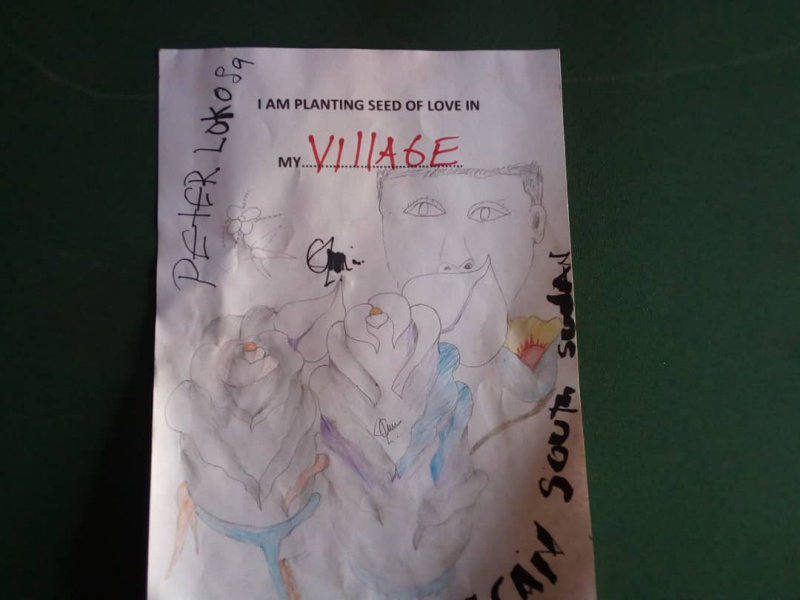 I am planting seeds of love in my village.
I am planting seeds of love in my village.
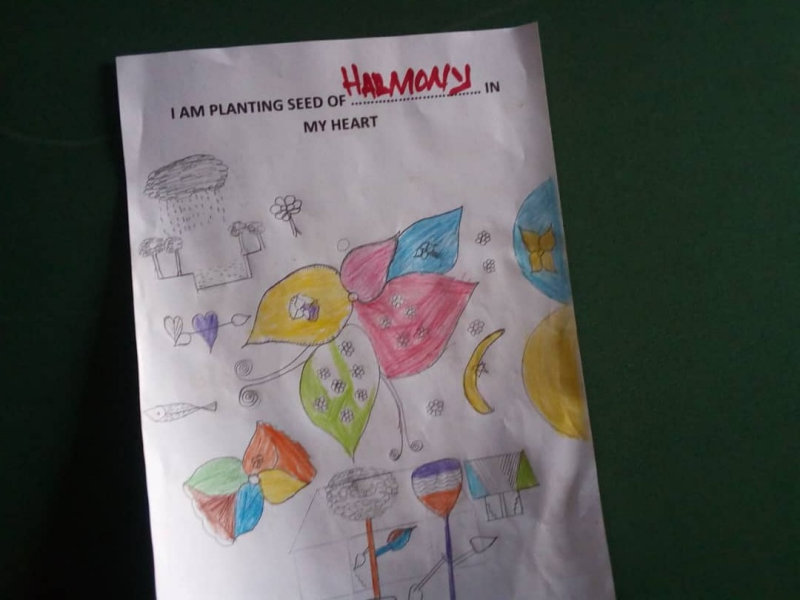 I am planting seeds of harmony in my heart.
I am planting seeds of harmony in my heart.
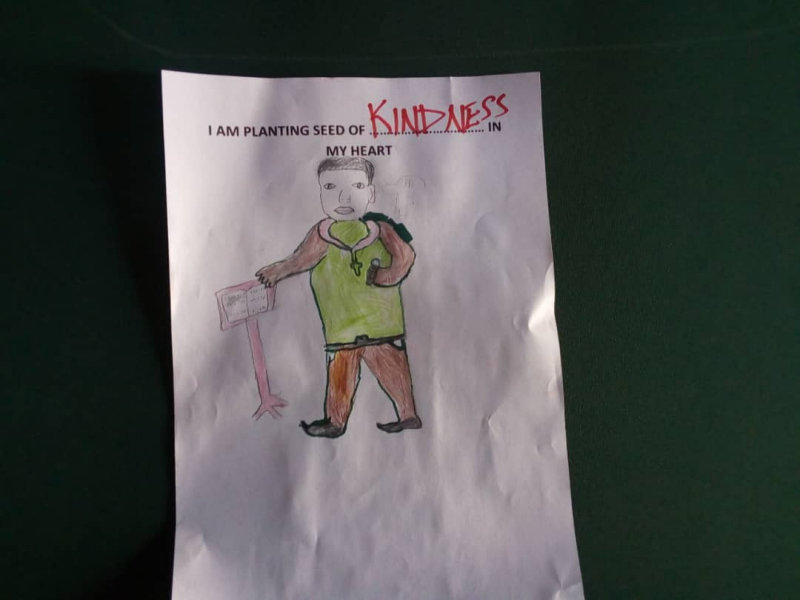 I am planting seeds of kindness in my heart.
I am planting seeds of kindness in my heart.
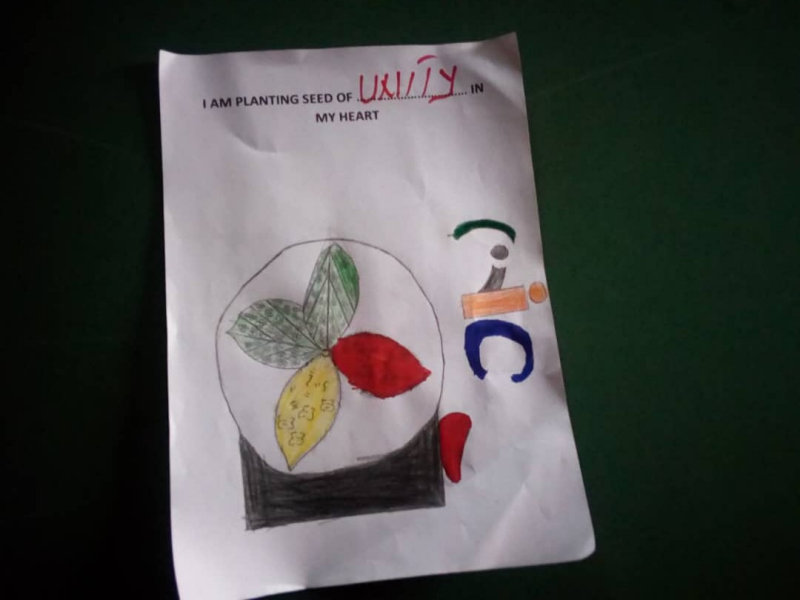 I am planting seeds of unity in my heart.
I am planting seeds of unity in my heart.
Through this program, the children understood they need to have love, peace, unity, kindness, and joy in their community. As a result, they have already chosen places where to plant their seeds when they germinate, for example, in churches, schools, hospitals, neighboring homes, and homes of their friends. Unity, love, sharing spirit, and cooperation have grown among the children as they carried out the activities together.
We are glad some of the CMN members shared with us their music, and we will teach the children the songs so that they can sing along as they do the activities. Hence we need more music on peace, love, and unity, and music that can engage the children in social activities. We welcome other activities too that can be shared with us.
We would like to extend this program to schools and churches; hence, we call on CMN Community to join hands with Pam Donkin in the support of this program in whatever way possible.
Engaging other children in the same activities we are doing can bring a nice exchange between the children in USA and our children. We will all plant seeds of love in South Sudan.
Pam: Yes, I agree. And we’d love to see CMN members ask teachers in their schools to make the Planting Seeds of Love book and Planting Seeds of Love gardens and then take photos or make videos to share with the children of I CAN. We can all form bonds of peacemaking and support of our efforts in our own areas.
To share how you planted seeds of love in your community, please email Pam at pamdonkin@gmail.com and/or Stephen at icankids829@gmail.com.